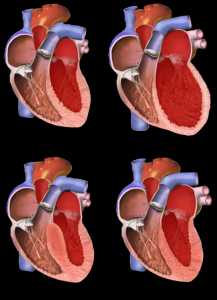04 Jan Children with Heart Failure from Dilated Cardiomyopathy are Surviving Longer in the Most Recent Era
MedicalResearch.com Interview with:
Rakesh K. Singh MD, MS
Department of Pediatrics, University of California–San Diego and
Rady Children’s Hospital
San Diego, California
Steven E. Lipshultz MD
Department of Pediatrics
Wayne State University School of Medicine and
Children’s Hospital of Michigan
Detroit, Michigan
MedicalResearch.com: What is the background for this study?
Response: Dilated cardiomyopathy (DCM) is a disease characterized by dilation and dysfunction of the left ventricle of the heart. While DCM is a relatively rare disease in children, nearly 40% of children with DCM require a heart transplant or die within 2 years of diagnosis. Heart transplantation has improved the outcomes of children with DCM over the last 3 decades, but is limited by donor heart availability. Newer therapies, including advanced ICU care and artificial heart machines, are now being used to treat children with DCM.
This study published in the November 28, 2017 issue of the Journal of American College of Cardiology (JACC) sought to determine whether more children with DCM were surviving longer in the more recent era. Specifically, it investigated whether children with DCM were surviving longer without the need for heart transplantation. Rakesh Singh, MD is the first author and an Associate Professor of Pediatrics at UC San Diego/Rady Children’s Hospital, while the senior author is Steven Lipshultz, MD, Professor at Wayne State University School of Medicine/Detroit Medical Center’s Children’s Hospital of Michigan and Director of Children’s Research Center of Michigan.
The Pediatric Cardiomyopathy Registry (PCMR) is a National Heart, Lung, and Blood Institute (NHLBI) sponsored registry from 98 pediatric centers in United States and Canada created to study the outcomes of children with various heart muscle disorders known as cardiomyopathies. For this study, outcomes of 1,199 children diagnosed with DCM from 1990-1999 were compared with 754 children diagnosed with DCM from 2000-2009.
MedicalResearch.com: What are the main findings?
The primary study result was that although the percentage of patients undergoing cardiac transplantation remained steady over time, survival was improved in the later cohort (patients diagnosed from 2000-2009). The authors hypothesized that the most likely reasons for this improvement could be improved medical therapy or increased use of mechanical support devices. Over the study period, there was likely increased use of medications commonly used in the adult population such as angiotensin-converting enzyme inhibitors and beta-blockers. Additionally, there has been a significant increase in the use of artificial heart machines known as ventricular assist devices in recent years.
MedicalResearch.com: What should clinicians and patients take away from your report?
Response: This study is the first known report to show improved transplant-free survival for pediatric DCM patients.
MedicalResearch.com: What recommendations do you have for future research as a result of this study?
Response: Further research including documentation of medical therapy and use of mechanical circulatory support will be necessary to understand the changes in survival over time seen in this study.
Disclosures: Supported by grants from the National Heart, Lung, and Blood Institute (HL53392) and the Children’s Cardiomyopathy Foundation. The contents of this publication are solely the responsibility of the authors and do not necessarily represent the official views of the National Heart, Lung, and Blood Institute or Children’s Cardiomyopathy Foundation. Drs. Canter and Kantor have served as consultants to Novartis. Dr. Rossano has served as a consultant for HeartWare. All other authors have reported that they have no relationships relevant to the contents of this paper to disclose.
MedicalResearch.com: Thank you for your contribution to the MedicalResearch.com community.
Citation:
Journal of the American College of Cardiology
Volume 70, Issue 21, 28 November 2017, Pages 2663-2673
Survival Without Cardiac Transplantation Among Children With Dilated Cardiomyopathy
Rakesh K.SinghMD, MSaCharles E.CanterMDbLingShiPhDcSteven D.ColanMDdDebra A.DoddMDeMelanie D.EverittMDfDaphne T.HsuMDgJohn L.JefferiesMD, MPHhPaul F.KantorMBBChiElfriedePahlMDjJoseph W.RossanoMD, MSkJeffrey A.TowbinMDlJames D.WilkinsonMD, MPHmSteven E.LipshultzMDmPediatric Cardiomyopathy Registry Investigators
Note: Content is Not intended as medical advice. Please consult your health care provider regarding your specific medical condition and questions.
[wysija_form id=”1″]
Last Updated on January 4, 2018 by Marie Benz MD FAAD

